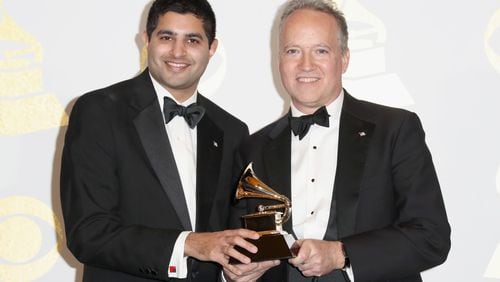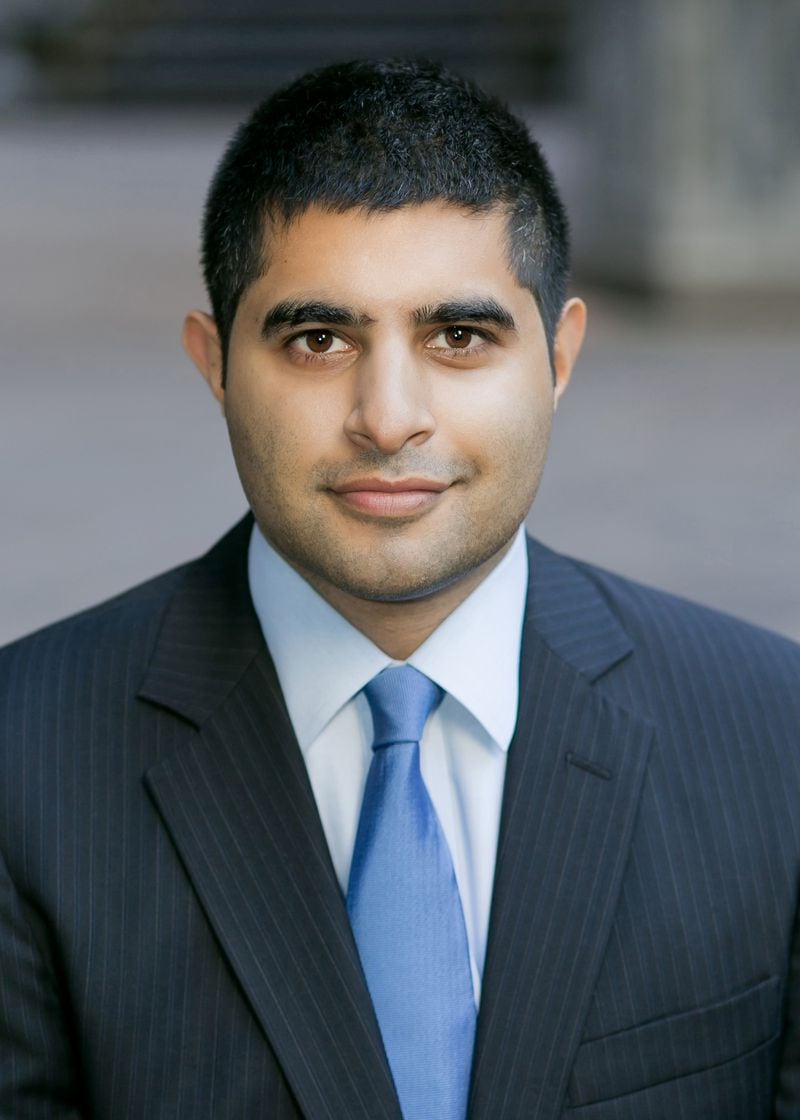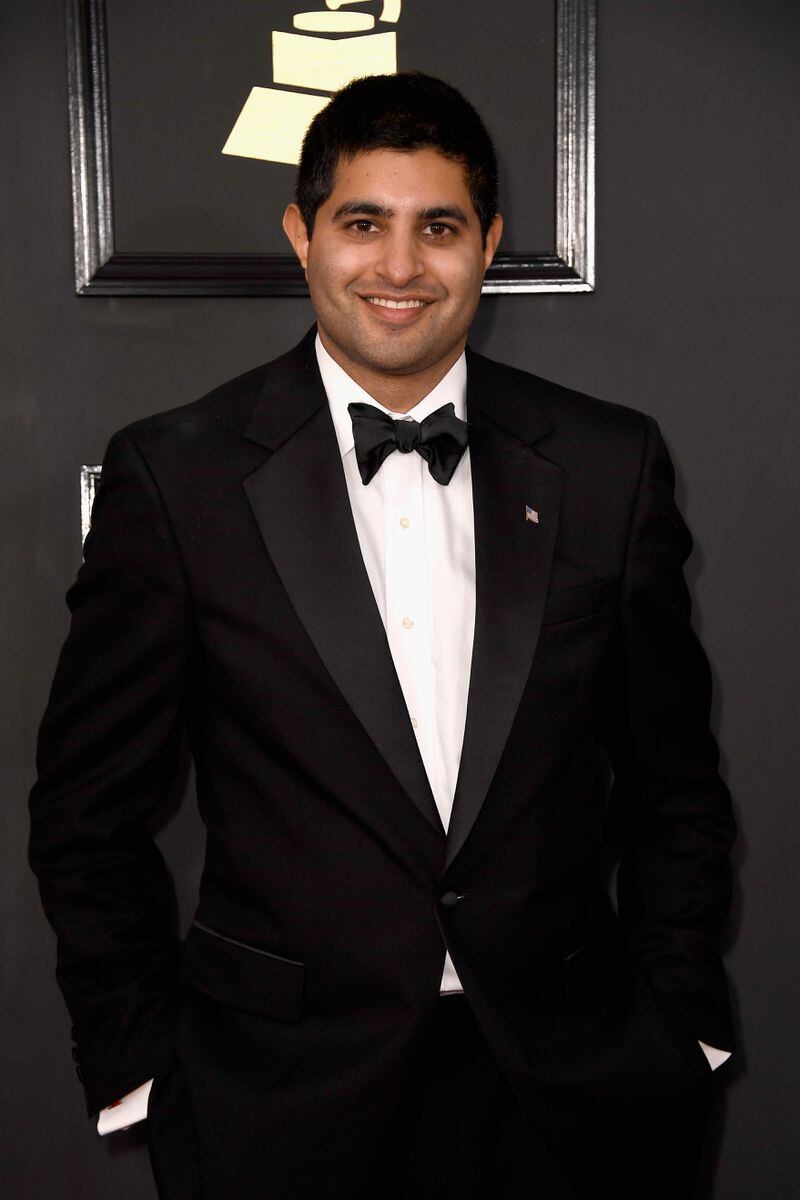To look at Kabir Sehgal’s accomplishments is to make one feel quite lazy.
He’s an author (“Jazzocracy” and “Coined: The Rich Life of Money and How Its History Has Shaped Us,” among his efforts); a former vice president in emerging market equities at J. P. Morgan; a former speechwriter for John Kerry; the founder of the non-profit Music for Tomorrow organization with Jude Law; and a Navy reservist.
He’s also an expert jazz bassist who toured with Wynton Marsalis and won his second career Grammy Award last month (best large ensemble jazz album) as executive producer and liner notes author for the Ted Nash Big Band’s “Presidential Suite: Eight Variations on Freedom,” a collection of notable names including Andrew Young, Glenn Close and Sam Waterston reading historical speeches set to an orchestral suite.
He also has a Latin Jazz Grammy for producing and writing the liner notes for Arturo O’Farrill and the Afro Latin Jazz Orchestra’s “The Offense of the Drum” in 2015 (best International album).
Oh, and he’s currently writing an opera.
And he’s 32.
“I relax by working,” the affable Sehgal said from New York, where he splits his time with his native Atlanta. “Instead of watching TV, I’d rather write an article or write a book or some music. It’s how I’ve always been.”
Sehgal, whose family lives in Sandy Springs, recently chatted about his extraordinary accomplishments.
Credit: Melissa Ruggieri
Credit: Melissa Ruggieri
Q: At what point did you become interested in music?
A: While I was in Lovett I was in the jazz band. It was an amazing experience because I participated in a program, the (Essentially Ellington High School Jazz Band Competition & Festival) by Jazz at Lincoln Center. They take 15 bands to go to New York and they perform and the top three play the finals and we went a couple of years while I was in high school. It was then that I realized there were other people who liked jazz at a high level and thought Miles Davis was cool. It was really an eye opener. I meet Ted Nash and Wynton Marsalis and they became mentors. I didn't think I would become a professional musician, but in terms of music being a force, that awakened that.
Q: And that continued at college?
A: At Dartmouth, I was in the university jazz band. Wynton invited me to tour with him (in 2004-2005). It was based on my conversations with him and Ted that I wrote my first book on jazz and democracy.
Q: What did you learn from being on the road with Wynton?
A: He's a genius, right? To have integrity with your music and do the work at a high level. There really aren't shortcuts. But obviously you learn over time that it's important to unlearn things. You don't have to play everything you know, but be more judicious or be more selective. I absorbed and admire his work ethic. He's obviously way more prolific than I am. I was with him a few months ago at a concert in Nashville playing holiday music and during intermission he was in the green writing his symphony. He calls it the 'army of one' and I've always admired him for that.
Q: Tell me about your involvement with the Ted Nash Big Band that led to this Grammy.
A: In 2013, Ted and Wynton and the Jazz at Lincoln Center Orchestra played (Atlanta) Symphony Hall and they doing the Chick Corea song "Windows" and I reached out to Ted and said, "You're an amazing arranger; let's do something together," and he said he was working on an idea of taking speeches and turning it into music. It was right up my alley, since I had been a speechwriter to John Kerry (during his presidential campaign). I said, "Let's do it," and that became a four-year odyssey of working on the "Presidential Suite."
Q: How did you determine the participants and material?
A: We recorded the music and then thought, why don't we get different readers to do each speech? Deepak (Chopra) had met (Jawaharlal) Nehru and we thought it would be incredible if he could do the speech ("Spoken at Midnight"). I've known Deepak because he had me on a radio show to interview me for another book. My godfather is (former mayor of Atlanta and ambassador to the United Nations) Andrew Young. He knew (Nelson) Mandela well, so it made sense for Uncle Andy to read that speech ("The Time for the Healing of the Wounds." Doug Brinkley and I wrote the liner notes together and he did the Reagan speech, "Tear Down This Wall." We tried to be thoughtful of who read the speeches.
Q: Do you think this work is even more important now, in our current political climate?
A: We rushed to get it out in 2015 but then thought maybe we should wait, so we did. We could not have predicted the decline of the political story. Ted's album came out in a time when the country was not just divided, but just being insulted back and forth and (this album) is a reminder that political oratory can bring us together and jazz is an echo of democracy. What you learn from jazz is that it's important to respect each other, and there is a musical quality to great speeches. Jazz is great modern music. It's rehearsed, but a part is not rehearsed, like the solo section…there is a lot of call and response.
Credit: Melissa Ruggieri
Credit: Melissa Ruggieri
Q: You now have two Grammys and one Latin Grammy. With all of your accomplishments, where do they rank?
A: Extremely high, it's a huge honor. I'm really humbled by it because it's recognition by our peers in the music industry; you just try to put out music at the highest level possible and the reward is the music and the icing on the cake is the Grammy. Last year and this year, it was really a blessing to also be part of the instrumental category (Nash won best instrumental composition for "Spoken at Midnight" and Sehgal's friend Arturo O'Farrill won last year for "The Afro Latin Jazz Suite"). That category is about doing things across so many fields, not just jazz, so I'm really proud.
Q: Did you enjoy the experience of the show?
A: This was my third year and you never get used to going. My parents and sister came and it was fun seeing them seeing it for the first time in person - they're usually at home streaming the (pre-show) ceremony on the laptop. Ted's father was there, so it was great to share this moment of joy with our families. My mom was mentioning that she was thinking back to when I first took piano lessons when I was 4; you can't really explain how proud I was to have my folks there. When I made my statement (while accepting the Grammy), I focused on my parents. I said, "I'm the son of immigrants."
Q: You appear to always be working on numerous projects, so what do you have in the works?
A: The thing I'm working on now is an album with Arturo (O'Farrill) and Tutu Valdez, two of the most well-known Latin jazz pianists and composers. Watching these two geniuses play piano together was really an honor of my life - not just a collaboration but the experience of being in the studio and pinching myself. That should be out later this year. I'm working on jazz opera about the European financial crisis. We're still working on getting singers. And I'm working on a couple of children's books - I do them with my mom (Surishtha) - about Indian festivals. It's amazing to be able to work with my mom on these stories. It's nice to see this next chapter, quite literally, of her career. They say the creative life is the most interesting life.









